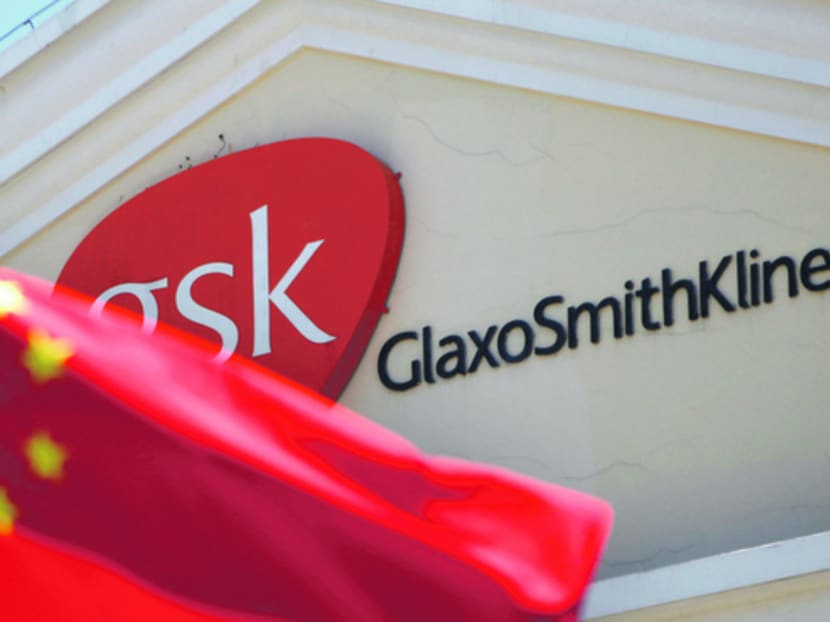S’pore to be GSK’s base for growth in Asia

A Chinese national flag is seen in front of a GlaxoSmithKline office building in Shanghai, July 12, 2013. Photo: Reuters
SINGAPORE — Pharmaceutical giant GlaxoSmithKline (GSK) announced yesterday that it will use Singapore as a base to steer its growth in Asia, with the set-up of a new regional headquarters here.
The eight-storey facility, with an area of almost 15,000 sq m, will be located in One-North. Construction is expected to be completed by the end of next year. The headquarters can house up to 1,000 employees across its pharmaceutical, vaccine and consumer healthcare businesses.
GSK, which has more than 700 office-based staff here, expects to add another 100 positions to its payroll in Singapore as the facility nears completion. The firm, which has played a key role in the growth of the Republic’s biomedical industry, said it had transferred almost 150 global or regional roles to the country over the past year.
Yesterday’s announcement came after GSK’s recent rocky ride in China due to a bribery scandal. Last year, the British-based drug maker was fined three billion yuan (S$620 million) after allegations, which first surfaced in 2013 , that it had channelled funds to travel agencies to facilitate bribes. It reportedly dismissed 110 employees in China for misconduct.
Nevertheless, speaking at the launch of the headquarters, Deputy Prime Minister and Finance Minister Tharman Shanmugaratnam said the “significant investment” had been more than two years in the making.
Mr Tharman noted that GSK’s regional headquarters here would be “one of three co-global ‘control towers’ alongside the UK and US, with the full suite of capabilities and autonomy to make decisions in Asia for Asia”.
Already, the Republic is the base for GSK’s state-of-the-art vaccine plant and two global manufacturing and supply sites for small molecule medicines. GSK’s Jurong plant is positioned as its “factory of the future” and the main product launch site globally, Mr Tharman noted.
“Collectively, GSK’s manufacturing plants in Singapore contribute to a majority of its worldwide pharmaceutical sales,” he said. “Just as GSK has been pivotal in the development of Singapore’s biomedical industry, we are proud that Singapore has played an integral part in GSK’s growth.”
Last year, biomedical sciences manufacturing produced an output of S$21.5 billion. The sector employs 16,800 people here. Mr Tharman noted that the Republic houses the regional headquarters of seven of the top 10 global pharmaceutical companies.
Referring to the SkillsFuture initiatives that he had said were critical to taking Singapore’s economy to the next level, Mr Tharman said the Economic Development Board is working with GSK “so it will be a strong partner for Singapore as we embark on our SkillsFuture journey: To reach the next frontier in our economy, anchored by skills and mastery, and to develop Singaporeans for leadership in various fields”.
He added that for its next stage of development, the biomedical industry would go beyond immediate value-chain activities into grooming leadership in developing regulatory standards and to prototype new business models. In this regard, GSK will be a key player, he said.
Analysts said the setting up of GSK’s regional headquarters here is a significant boost to the Republic.
Mr Leon Pereira, chief executive of Spire Research & Consulting, said: “Global pharmaceuticals are aware of Singapore as a centre for ingredient manufacturing. But with GSK, one of the top-tier companies, setting up its global headquarters for Asia here, it will help influence the flow of foreign direct investments to Singapore.”
Ms Rhenu Bhuller, senior vice-president of healthcare at Frost & Sullivan Asia Pacific, noted that while the number of jobs added is not large, the move would enhance Singapore’s reputation as a regional hub for life sciences. She added that the sector could see more Asia-Pacific-driven research based here as a result, especially in vaccine production for diseases such as dengue.
She also noted that some firms such as GSK are realising the challenges of operating in China. “The Asia-Pacific regional headquarters of many companies were mostly in Singapore and Hong Kong. After the China boom, many firms made the strategic decision to relocate to China. But operating in China has turned out to be much more difficult than they expected and didn’t really give the returns they wanted.”






